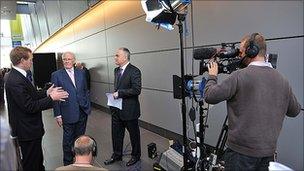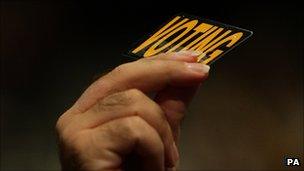Security row as Lib Dem activists meet for conference
- Published

Interest in Lib Dem conferences has risen since the party entered government
The Liberal Democrat conference has changed somewhat in recent years.
In 2008, delegates could have been forgiven for feeling somewhat peripheral as the world woke up to the news of the collapse of Lehman Brothers.
A year later, even with a general election looming, internal disagreements over spending cuts and benefit changes elicited little more than mild interest outside the conference halls.
But entering government made last year's gathering headline news and the presence of several cabinet ministers saw security noticeably ramped up.
This took a bit of getting used to for Lib Dem activists accustomed to the more relaxed, informal atmosphere of the get together and the issue has become even more heated this year.
Party members are so concerned about security arrangements for the event in Birmingham that they will be debating them on the floor of the conference.
A motion put forward by activists from Yeovil and Brent invites party members "to condemn the system of police accreditation" for the five-day conference.
'Undemocratic'
For the first time this year, those wishing to attend are required to provide details of their address as well as identification in the form of a passport, driving licence or National Insurance details.
Acting on the advice of West Midlands Police, the party says the step is necessary to identify anyone who might pose a "very serious security threat" to the conference.
Providing such information is standard procedure these days in many areas.
Given that these rules have been applied to Labour and Conservative conferences for several years, people may well ask what all the fuss is about.
But some Lib Dem activists say they regard the matter as a point of principle and believe it goes to the heart of the party's values and tradition of upholding of civil liberties.
"Our conference is more democratic than the other parties in that we actually change policy and local parties elect their representatives," says David Grace, secretary of the Yeovil constituency party.
"You can't have the state deciding who attends our party conference. It does seem to be fundamentally undemocratic."
He fears the personal data will be used to recommend that people be barred from attending the event - a situation which he says has arisen at both Labour and Tory conferences.
He is also worried about what the authorities might do with the information in the future.
"I don't think it is for any organ of the state, let alone the police, to say you may not have this person at the conference. It is more like a communist country than a democracy."
The Lib Dem conference has become an altogether bigger affair since the party entered government, with delegate numbers increasing by 30% last year and greater corporate interest.
One leading party activist and former MP suspects commercial realities explain the new security arrangements.
"We already put up with long queues to get in, as security staff empty the handbags of old ladies," says Evan Harris - who lost his seat at the 2010 election.
"We are not objecting to inconvenient security measures, just intrusive ones that do not seem to represent any real increase in security. The real reason for the accreditation is to get insurance."
Without insurance, the party says, venues would not be willing to hold such a high-profile event and it risks being invalidated if they are shown to have acted against police advice on accreditation.
'Final decision'
Andrew Wiseman, chairman of the Federal Conference Committee, defends the party's stance - saying it had initially been "reluctant" to adopt the new procedures but believe they are right and proportionate.

The Lib Dems regard their gathering as a policy-making forum rather than a rally
"We do need to look seriously at the security threats, including those which are new as a result of us going into government," he says.
The new arrangements are not designed to weed out potential troublemakers or critics of the leadership, he insists, and the party retains the right to overrule the police.
"There has been some suggestion that this means the police will decide who can come to conference. This is absolutely not the case as the final decision will rest with the party."
Plea to attend
With this year's conference being held shortly after the tenth anniversary of the 9/11 attacks, security will be foremost in people's minds.
Critics such as David Grace say they are not opposed to reasonable security measures but believe the party must dictate the terms and not be beholden to either the police or the Home Office.
"As the party which has been most outspoken about human rights and not giving up our basic rights because we are fighting terrorism, we have to be consistent in our own procedures," he argues.
A quick glance at Lib Dem internet forums suggests that opinion on the issue is divided.
Some activists have urged the party to "grow up" and accept the responsibilities and burdens of being in government but others are saying they feel so strongly that they might boycott the conference.
Mr Harris says activists upset about the issue should focus on lobbying the party's decision-makers.
"It seems best to do what Lib Dems always do, which is engage in seeking to change the law," he says. "But not coming to the conference, where we can make the point on the agenda itself, seems self-defeating and a less effective approach than engaging with the issues."